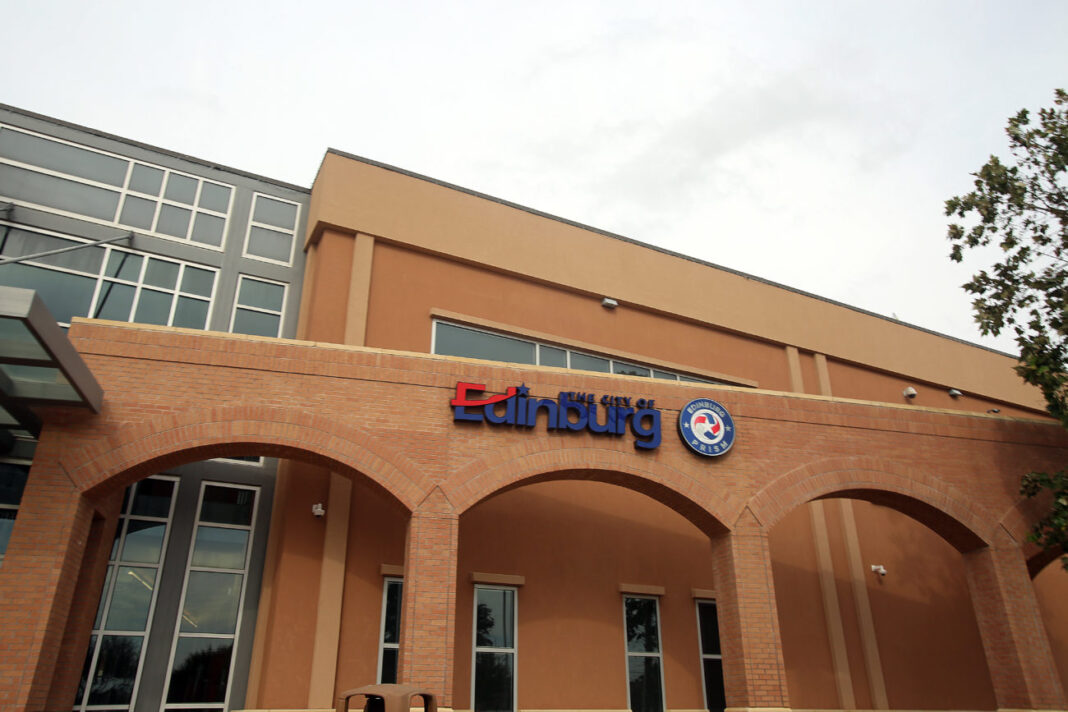The new Edinburg City Council rolled back changes the previous council made in 2020 on how it interacts with the Edinburg Economic Development Corporation.
The city council voted 3 to 2 to allow city council members to once again serve on the EDC board and voted unanimously to cut down on which EDC actions have to be ratified by the city council.
Approval of the changes followed lengthy discussions by the city council which includes three newly elected members — Mayor Ramiro Garza Jr., Jason De Leon and Dan Diaz — as well as city council members David White and Johnny Garcia who is now mayor pro-tem.
The council met virtually on Tuesday after White tested positive for COVID-19 while Garza and Diaz said they each had relatives who had also tested positive.
In May 2020, the city council amended the EDC bylaws by requiring that the city council approve all policies, actions and expenditures, prohibited city council members from serving on the board and increased the number of EDC board members from five to seven.
The revisions also required that the EDC board members represent specific business, education and public service sectors, required that the EDC’s administrative functions be performed by the city staff as opposed to a separate staff, and required that the corporation provide regular financial and activity reporting to the city council.
The rollback of those 2020 revisions that were approved Tuesday now require that one council member serve on the EDC board and allow an additional council member to serve if there is another vacancy.
Garza, White and Diaz approved the motion while De Leon and Garcia voted against it.
De Leon explained he would want the EDC board to be composed of only citizens or have two council members on the board, not just one. He explained that he believed having only one council member might intimidate the rest of the EDC board, but a second council member could keep an eye on the other.
But adding two council members would require the creation of another position on the EDC board or dismissing a current board member, a move the council seemed to be against.
Garcia, for his part, wished to keep the EDC board as it was and put off any changes until they had held a workshop.
Both outvoted, the council moved forward in requiring a city councilman to serve on the EDC and then voted to have Diaz be that council member, appointing him to a position that was once already his.
Diaz served on the EDC board until just last month when he resigned due to his election to the council.
De Leon and Garcia also voted against Diaz’s reappointment.
While somewhat divided on who should serve on the EDC, the city council agreed to no longer require the council to ratify every action taken by the corporation.
Instead, the council will specifically need to ratify projects, properties and programs.
City Manager Ron Garza explained that the previous revisions had been a little too aggressive in requiring all actions to be ratified.
For the mayor, who once served as the EDC’s executive director, the important EDC actions to focus on were those that included any incentives the corporation was giving out for projects.
“We do need to have oversight and I think we do need to approve the projects or funds that are being provided as incentives for businesses,” the mayor said.
The president of the EDC board, Hiren Govind, spoke during the public comment portion of the city council meeting in support of maintaining most of the revisions adopted in 2020.
“We believe our system with citizens on the board and part of our agenda items getting approved by the council is a good idea,” Govind said. “I like that our citizens were elected, they were able to all apply for the positions and you as the council in open session discussed each one of us with City Manager Garza and chose each one of us in open session.”
He added, “I don’t believe a councilman should be reappointed to our board; I believe it should stay the citizens.”
However, Govind did agree that not all EDC actions needed city council approval.
“I do believe some policy changes are needed,” he said. “If all projects went to the city council for approval and promotional items stayed and just got approved by us, I think it would kind of clean up some of the backlog and some of the agenda items going back and forth.”
As an example, he noted that the EDC was not able to donate to the police department’s Operation Blue Santa because a city council meeting was not scheduled within the time necessary to approve it.
Operation Blue Santa is a program through which the police department donates toys to “those in need” during the holidays.
“For things like that, I think we should have been able to just approve it and not have to go to city council,” Govind said.





